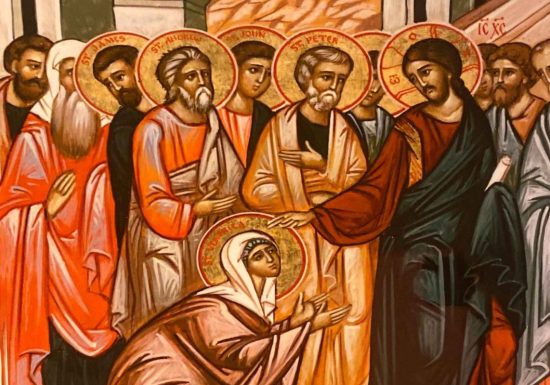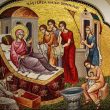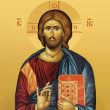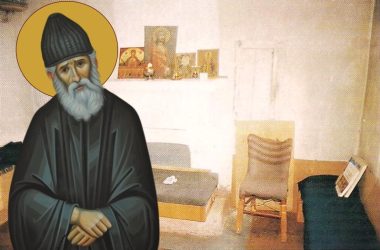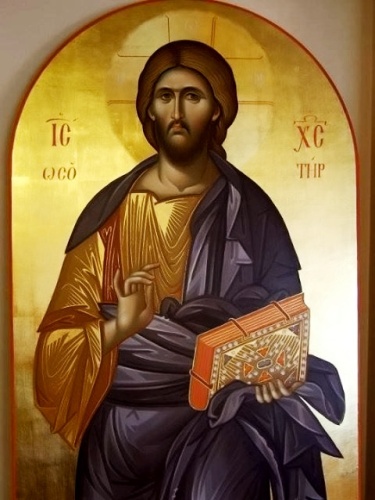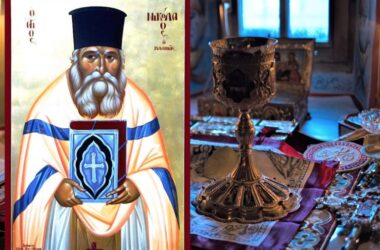Healing a woman in distress
‘And a large crowd followed him and pressed in on him. Now there was a woman who had been suffering from hemorrhages for twelve years. She had endured much under many physicians, and had spent all that she had; and she was no better, but rather grew worse. She had heard about Jesus, and came up behind him in the crowd and touched his cloak, for she said, ‘If I but touch his clothes, I will be made well.’ Immediately her hemorrhage stopped; and she felt in her body that she was healed of her disease. Immediately aware that power had gone forth from him, Jesus turned about in the crowd and said, ‘Who touched my clothes?’ And his disciples said to him, ‘You see the crowd pressing in on you; how can you say, “Who touched me?” ’ He looked all round to see who had done it. But the woman, knowing what had happened to her, came in fear and trembling, fell down before him, and told him the whole truth. He said to her, ‘Daughter, your faith has made you well; go in peace, and be healed of your disease.’ (KJV)
Why does God allow suffering?
Saint Basil the Great, the Lesser Rules, Chapter 314, in Parinti si Scriitori Bisericesti (1989), vol. 18, pp. 459-460.
‘(…) Whether it is so that someone, being righteous, may be distinguished and placed in a shining light like Job, to whom God said: ‘Will you condemn Me that you may be justified?’ (Job 40:8); or whether it is so that through patient endurance of sufferings, one may be worthy of consolation in the future life, like Lazarus, of whom Abraham says that he received evil things in his life, which is why he is comforted here (Luke 16:20). Or whether it is so that someone, being in sins and deceiving many, is exposed through illness, according to what the Apostle said: For he who eats and drinks in an unworthy manner eats and drinks judgment to himself, not discerning the Lord’s body. For this reason many are weak and sick among you, and many sleep (1 Corinthians 11:29-30). Or whether it is so that, being punished, one may turn (reform): But when we are judged, we are chastened of the Lord, that we should not be condemned with the world (1 Corinthians 11:32); which applies to those who, in their suffering, will not reform, whose stubbornness in wickedness amazed the prophet, making him say: O LORD, are not thine eyes upon the truth? thou hast stricken them, but they have not grieved; thou hast consumed them, but they have refused to receive correction: (Jeremiah 5:3). Or whether it is so that, just as in the example of bodily illness, the wickedness of sins may be revealed even to the one who has sinned, often without knowing it, and not to his visiting friend, or to the one tried by his own wickedness, as in the case of the paralytic to whom the Lord says in the Gospel: ‘Afterward Jesus findeth him in the temple, and said unto him, Behold, thou art made whole: sin no more, lest a worse thing come unto thee.’ (John 5:14). (…) And often, for the proof of human nature, the weakness of the body is arranged as evidence of the power of God, as the Apostle himself says about himself: ‘And lest I should be exalted above measure through the abundance of the revelations, there was given to me a thorn in the flesh, the messenger of Satan to buffet me, lest I should be exalted above measure. ‘(2 Corinthians 12:7).’
Clement of Alexandria, Stromata, Book 6, Chapter 15 – 122.2-122.3, in Parinti si Scriitori Bisericesti (1982), vol. 5, p. 453.
‘The proof that truth is with us is the fact that the Son of God Himself has taught us the truth. If the foundation of any investigation consists of these general elements: the person and the thing, then only with us does the truth truly appear; the person in whom the truth is revealed is the Son of God, and the thing is the power of faith, which has overcome everyone who has opposed it, whoever they may be, and even the entire world that has opposed it. But because this is recognized by everyone and is strengthened by eternal facts and words, it is clear that the one who does not believe that there is providence and is truly without God deserves punishment and does not deserve to be argued with. Before us lies another task: what to do and how to live in order to attain the knowledge of Almighty God, and how to honor the Divinity in order to be the cause of our own salvation. We know, then, that we learn and understand what is pleasing to God not from sophists, but from God Himself; therefore, we seek to work with righteousness and holiness.’
Clement of Alexandria, Stromata, Book 2, Chapter 6, 28.1-28.2, in Parinti si Scriitori Bisericesti (1982), vol. 5, p. 128.
‘Faith is a presupposition that you willingly accept, it is a reasoned supposition before understanding, it is the expectation of something that you will acquire in the future – the expectation of other things, apart from those of faith, is an opinion regarding uncertain things – and assurance is the firm conviction that you will receive the thing you are expecting. Therefore, we believe because we are assured of what we believe. And this is for the glory of God and our salvation. We have confidence in the one God alone, about whom we know that He will not break the good promises He made to us, He will not deny us those blessings created by virtue of His promises, given to us willingly.’
Source: http://ziarullumina.ro

